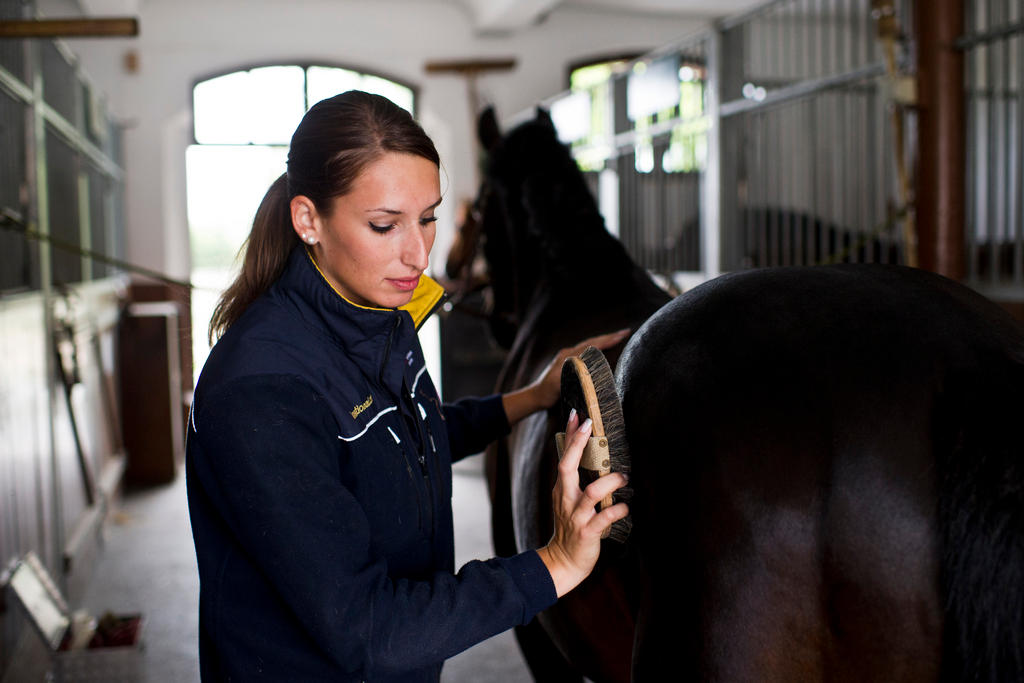Apprenticeships and their social status – your views

We asked readers whether apprenticeships were considered a good option for young people in their home countries. While there were many positive voices, many said “not always”.
Earlier this month swissinfo.ch published an article about whether social status plays a role in young people’s career choices – i.e. apprenticeship or academic route – in Switzerland. It featured a study that found that apprenticeships had not actually lost their social status, like some had feared.
+ Here’s the original article on social status and career choice
Vocational training was still popular among the Swiss and migrants from neighbouring countries like Austria and Germany. It was another matter among foreigners with no strong apprenticeship tradition.
Our – non-scientific – polls on social media showed that swissinfo’s international readers were more or less split over whether apprenticeships were considered a good option in their home countries as well: on twitter it was 55% yes/45% no: on Facebook it was 59% yes/41% no.
A further snapshot of our readers’ views came in the comments.
Happy to report it’s becoming a viable learning avenue in Washington State – just a “little biased” being Swiss apprenticeship trained! #CCLExternal link #walegExternal link #ModernLearningExternal link @COEAerospaceExternal link @WashCTEExternal link @Steminista509External link
— Michael Werner (@heywerner59) July 18, 2018External link
For example, the state recently appointed former US ambassador to Switzerland Suzi LeVineExternal link as commissioner of the Employment Security Department. She has been working on establishing apprenticeship offerings in several states since her return to the US. The state has also expanded its youth apprenticeship programmeExternal link for the aerospace and advanced manufacturing industries.
More from the US
On Facebook, Alan Thomas and Anton Zurbrügg said there were a network of schools offering apprenticeships in the US, although Zurbrügg said they were “widely variable and patchwork across the country”.
“One of the main obstacles in my opinion is social resistance by families to have their children educated to follow a “blue collar” trade… too many parents insist that the only acceptable option for their children is to pursue a 4-year university baccalaureate degree which may or may not have reasonable future employment potential,” Zurbrügg posted. Thomas agreed: often technical and trade schools were often seen as a “second choice, if you can’t get into a four-year college”.
From South Africa to India
Pauline Matt said that apprenticeships used to be well respected in South Africa, but that this was no longer the case. Given the high unemployment rate in the country, vocational training would be a means of “upliftment”, she said.
Carlo Peretti, from Italy, bemoaned the fact that the country had started to introduce vocational training, but “that’s absolutely useless and mothering compared to the Swiss lehre (apprenticeship)”.
Meanwhile on twitter, Sanjeev Agrawal commented on India.
In developing countries like mine (India), apprenticeship is becoming popular for the theoretical foundation it provides for skilled jobs.
— Sanjeev Agrawal (@SwissSanjeev) July 17, 2018External link
But also looked at the how immigrants view apprenticeships in Switzerland.
As an immigrant parent to two teenage kids, I feel that a Swiss apprenticeship is valued in most parts of the developed world, but cannot have the status of a stand alone qualification that it enjoys in Switzerland.
— Sanjeev Agrawal (@SwissSanjeev) July 17, 2018External link
As did Joelle Nebbe-Morand, writing from the United Kingdom.
I understand why immigrants would not trust the Swiss apprenticeship – yes, it has status in Switzerland, but what if your kids want to migrate out again? Makes total sense to me. https://t.co/6HdprsvGaRExternal link
— Joelle Nebbe-Mornod (@iphigenie) July 17, 2018External link
Praise for Switzerland
Several readers spoke of their own experiences.
Eliane Rochat, posting in French on Facebook, was involved in apprenticeship training in canton Vaud, and said vocational training got students in contact with “real life”.
“In my area (pharmacy) we trained dozens of apprentices who started mostly at age 16, still young adolescents, and who sometimes finished their training having repeated a year. This never had any repercussions on their relationships with their bosses or put them at risk of not finishing their training,” she said. Some even went on to get higher qualifications.
+ Read more about how the Swiss dual track system works here
Swiss, now living in the UK. When people ask me about my background & find out I was an IT apprentice (KV-Informatik), they appreciated that I was given an option for an alternative education journey. University doesn't suit all learners & hands on exp has given me a head start.
— Tanja Lichtensteiger (@grappleshark) July 17, 2018External link
Reader Wanderer pointed out in comments on the article that tradespeople were still needed across Europe. Switzerland had “better stick with VET [vocational education and training] and ensure that employers support it by giving the apprentice a job”.

In compliance with the JTI standards
More: SWI swissinfo.ch certified by the Journalism Trust Initiative





You can find an overview of ongoing debates with our journalists here. Please join us!
If you want to start a conversation about a topic raised in this article or want to report factual errors, email us at english@swissinfo.ch.